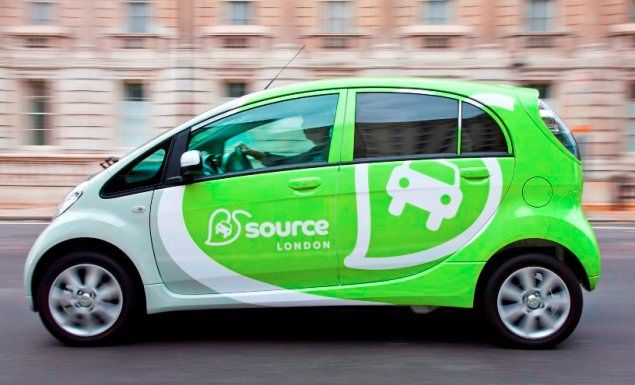There are 2400 electric vehicles currently in service around London, with 1800 of those registered for the congestion charge.
While that number pales in comparison to the number of petrol-guzzling cars on the road, it's something that Paul Cowperthwaite - the man responsible for the operation of Source London, the networking of electric charging stations in Greater London - still has to worry about.
"We've got 400 charging stations in London already. These are a combination of on-street charging points, ones in publicly accessible car parks, like supermarkets, or private car parks or businesses," says Cowperthwaite. "We plan to have 1300 by the end of 2013."
That means nobody living in the Greater London area will be more than a mile away from a charging station, as long as they've signed up to the scheme, which costs just £10 a year. At 1300, there will be more charge points than petrol stations - although not pumps - in London when the building phase is complete.

Backed up the government and Transport for London, Source London was launched in May 2011 by the Mayor of London, Boris Johnson. The goal of the scheme is to provide power points for the growing number of electric cars that are starting to come into the city every day.
Electric vehicle owners who are a part of the scheme can drive up to a charging point and plug in their car to charge. The £10 membership provides unlimited electricity throughout the year; although you will more than likely still have to pay for the parking.
The Source London scheme aims to be the single option for charging your electric vehicle, like the Nissan Leaf, in London and unifying the capital is already under way.
"We will have one unified scheme soon," Cowperthwaite tells us, before explaining that the many different schemes run by the London boroughs will eventually be apart of the Source London offering. In the future, those looking for a charging station in Westminster won't have to pay the council.s current £75 a year tariff, just Source London's much cheaper offering.
And it's not just London that Cowperthwaite has aspirations of unifying. There are already plans to expand the scheme outside of the M25 working in partnership with other UK schemes.
"We are actively working with other schemes around the country to make sure there is interoperability," he confirms.
That's good news if you want to charge your way around the country, and is sure to be welcomed by the thousands of electric car owning drivers in need of power.
Currently, the UK's charging system is a bit of a mess with several different schemes popping up, but none working with others. It's like being able to use petrol only from London in cars bought in the capital, for example.
That interoperability aspiration is linked to ambitions for a single name as well.
"We are letting other schemes use the 'Source' branding. We already have 'Source East' that covers East Anglia. The idea is that people become use to the 'Source' brand across the UK. We can't dictate that other schemes use this brand, but we hope they will."
As for the future, it's still to be decided. The 1300 goal is the focus of efforts at the moment, as is making sure the Olympics can be powered by electric if need be.
Of the 900 charging stations still to be installed, Source London has said that around 400 of those will be going in over the next couple of months, many of which will support the Games.
"We've got a very big couple of months ahead," Cowperthwaite acknowledges.

For the Olympics, in particular, Source London is working with EDF, GE and BMW to install 120 fast charging points to be used by one of the 160 Active E or 40 MINI E electric vehicles provided by BMW for the Games-time fleet. The points will be installed in five key locations in London and promise to charge a car in four hours, compared to the normal overnight trickle charge.
Other future plans include automatically bundling membership with new electric cars. And Cowperthwaite confirms that they are in talks with Nissan to ensure new Nissan Leaf drivers are signed up, and ready to charge, from day one, as well as teaming up with companies like British Gas to offer a home-charging install kit to make it easier for people to charge their cars at home.
We asked what locations were popular in the capital for electric vehicles? Cowperthwaite doesn't know. Not because he doesn't want to know, but because of the limitations of the charging stations installed.
"We don't collect usage data at the moment," he confirms, before adding: "We know that they are being used, though."
Source London doesn't collect data on the amount of electricity being used, it doesn't even record the details of RFID keys that are used to unlock the charging stations.
"It's a big of a chicken and egg situation at the moment," says Cowperthwaite. "If you don't have the charging infrastructure it puts people off buying; but by putting the charging structure in place we are hopefully encouraging people to take up and buy electric vehicles."
The interview is drawing to a close and we ask our final question. Are people using the charging stations to power devices other than cars? After all, if it's just a plug, we could easily see them being used to charge a laptop or a mobile phone.
Cowperthwaite smiles at the randomness of our question: "We aren't aware of people charging anything other than cars at the moment."

